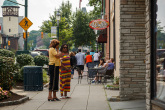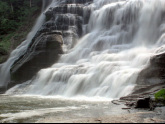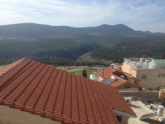I want to go local not only due to growing concerns about fossil fuels, climate change, and economic instability, but also because the best times of my life have been in walkable communities with substantial green space, social engagement, meaningful work opportunities, and/or an enduring sense of place. Communities like

· East Brunswick, New Jersey, where I spent my formative years walking unsupervised to Lawrence Brook Elementary School, playing for hours in a sand pile in my backyard, showing up at friends’ houses without having to arrange a playdate, and knowing nearly everyone on the block; and South Orange, New Jersey, a traditional green village where many of the shop owners knew me by name, and where kids often attended the same schools as their parents before them.

· Ithaca, New York, and Ann Arbor, Michigan, leafy college towns with scenic parks and waterways, local farms, vibrant main streets dotted by bookstores and cafes, and diverse cultural amenities. Designed to be pedestrian and bike-friendly and bolstered by strong local economies, college towns like these have a lot to teach us about post-carbon living.

· San Francisco’s Cole Valley neighborhood, where I lived in a garden apartment and walked to work near Golden Gate Park. On a typical workday I would run into friends or coworkers on my way home—on the sidewalk, in the Real Food Company grocery store, at the Tassajara Bakery, and at other local businesses.

· The ancient, 3200-foot-high city of Safed in Northern Israel, where I participated in a work-study program in which I helped build stone walls of a children’s park and painted rooms for immigrant families. Not once getting behind the wheel for three months, I enjoyed a daily routine of green mountain views, unplanned interactions and leisurely meals with program participants and neighbors, study of a millennia-spanning religious tradition, and work aimed at improving the quality of life in the community for generations to come.
I want to go local because I love immersing myself in walkable communities like these where people have easy access to nature, neighborhood, and the work of their heart, and/or the larger history of which they are a part. And I want more of the world to experience the joys of living in such places.
I believe the most promising way to make that happen is to transform our cities and towns into post-carbon, locally resilient communities. The more we produce and consume locally, the more we come to know and treasure the land and people around us, and the more we experience work as a way to serve the land and people we love—for now and for future generations. Oh, the places we can co-create!
I believe the most promising way to make that happen is to transform our cities and towns into post-carbon, locally resilient communities. The more we produce and consume locally, the more we come to know and treasure the land and people around us, and the more we experience work as a way to serve the land and people we love—for now and for future generations. Oh, the places we can co-create!
 RSS Feed
RSS Feed